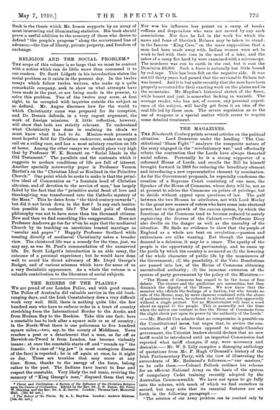THE RIDERS OF THE PLAINS4'
WE are proud of our London Police, and with good reason. The Police of Australia did valuable service in the old bush- ranging days, and the Irish Constabulary does a very difficult work very well. Still, there is nothing quite like the few hundred men who have to enforce order in a tract of country stretching from the International Border to the Arctic, and from Hudson Bay to the Rockies. Take this one fact: here a constable has to look after a square mile or so of country ; in the North-West there is one policeman to five hundred square miles,—two, say, to the county of Middlesex. News reaches a poet or a detachment that a man, as far off as Berwick-on-Tweed is from London, has become violently insane ; at once the constable starts off and " rounds up " the lunatic. Or a ease of " big jaw " (a most contagious disease of the face) is reported ; he is off again at once, be it night or day. These are troubles that may occur at any time. Some, thanks to the energy of the force, belong rather to the past. The Indians have learnt to fear and respect the constable. Very likely the red tunic, reviving the memory of " King George's men," disposed them that way.
• Christ and Civilisation: a Survey of the influence of tile Christian Religion 4,on the:tine:7: Ic:! CieSisatto. Anted by.e.theLtej2n)r:. J. B. Paton, Sir Percy W. [Hs. ad. net.] t The Riders qt the Plains. By A. L. Hayden. London: Andrew Helmet. [10s. ed. net.]
Nor was his influence less potent on a camp of horde/ ruffians and desperadoes who were not moved by any such associations. Nor does he fail in the work for which the name and fame of Sherlock Holmes may be taken to stand ; in the famous " King Case," on the mere supposition that a man had been made away with, Indian women were set to work to feel with their toes in the mud of a lake, and the ashes of a camp fire hard by were examined with a microscope. The murderer was run to earth in the end, but it cost the Dominion £6,000. Such a force is naturally but little bound by red-tape. This has been felt on the negative side. It was not till thirty years had passed that the serviceable Stilson hat was issued. And it is but quite recently that the men have been properly accoutred for their exacting work on the plains and in the mountains. Mr. Haydon's historical sketch of the force, while honest and just, is somewhat lacking in warmth. The average reader, who has not, of course, any personal experi- ence of the subject, will hardly get from it an idea or the real life led by these men. The severe regulation as to the use of weapons is a special matter which seems to require some detailed treatment.










































 Previous page
Previous page